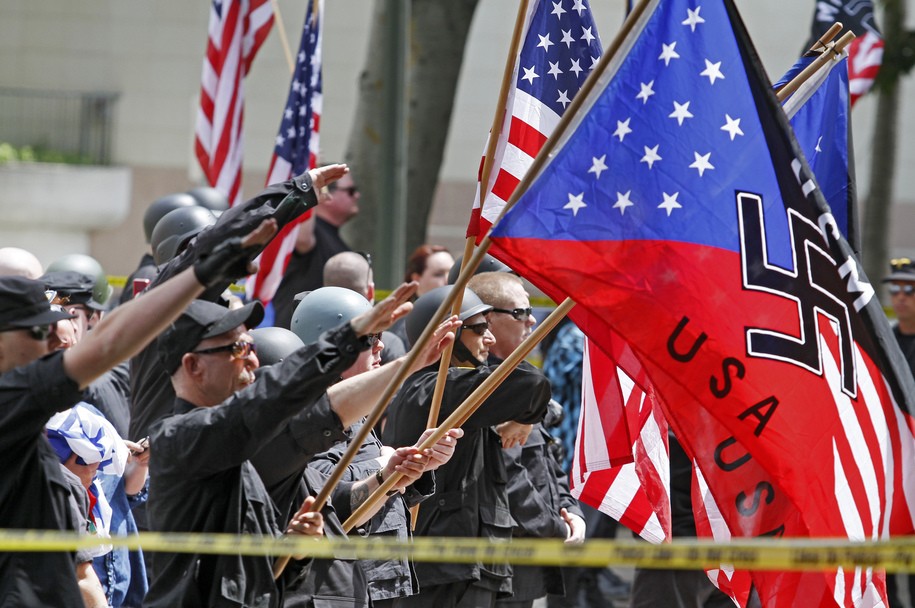On top of everything else, today the FBI arrested a young man in Oklahoma City who had planned to blow up a bank. The man is associated with a right-wing anti-government movement calling itself the Three Percenters, which has ties to Oath Keepers and the Bundy Militia. Can we now admit we have a problem with right-wing domestic terrorism, finally?
Someone seems to have been able to persuade Trump he needed to say something more about Charlottesville —
After two days, blistering criticism from his own party and tougher anti-white-nationalist statements from the company that makes Tiki torches and German Chancellor Angela Merkel, President Trump dragged himself to the podium for a statement that specifically condemned white nationalists, neo-Nazis and other racists. He had to begin with some self-congratulations on the economy — because his accomplishments are what he really cares about. He told the country, “To anyone who acted criminally in this weekend’s racist violence, you will be held fully accountable. Justice will be delivered.” He finally spit it out by calling racism “evil” and condemning the “KKK, neo-Nazis, white supremacists and other hate groups.”
He read from a teleprompter. Speaking from his heart would have been impossible, given his obvious lack of passion and willful blindness over the past couple of days. He did not mention the “alt-right,” nor did he announce he is firing Stephen K. Bannon, who once bragged he gave the alt-right a platform at Breitbart. He did not announce any specific policy measures. He did not apologize for his moral obtuseness. This was the weakest statement he could have gotten away with, 48 hours too late. Why did it have to come to this?
But he had already failed the Acting Like a Grown Up test earlier today. Kenneth Frazier, chairman and CEO of Merck, withdrew from Trump’s American Manufacturing Council to protest Trump’s insipid response to Charlottesville. Frazier, who is African American, wrote,
“America’s leaders must honor our fundamental values by clearly rejecting expressions of hatred, bigotry and group supremacy, which run counter to the American ideal that all people are created equal. As CEO of Merck and as a matter of personal conscience, I feel a responsibility to take a stand against intolerance and extremism.”
So this morning Trump tweeted:
Now that Ken Frazier of Merck Pharma has resigned from President’s Manufacturing Council,he will have more time to LOWER RIPOFF DRUG PRICES!
— Donald J. Trump (@realDonaldTrump) August 14, 2017
Amber Phillips in WaPo writes that Republicans, Republican senators especially, have been remarkably critical of Trump regarding Charlottesville.
A number of Senate Republicans criticized nothing less than the way Trump chose to be president Saturday. They publicly and directly condemned his words and actions. More specifically, they criticized his lack of words and actions to clearly and forcefully denounce the white supremacy roiling Charlottesville’s streets and seizing the nation’s attention. …
…There’s no nuance in those statements, no need to read between the lines. These Republicans think the president did a bad job being president in the midst of a violent, fraught crisis. Their criticism carries extra heft when you consider that these lawmakers mostly weren’t prodded by reporters, microphones thrust in their faces, to say any of this. Congress is on break, so wherever in the world these lawmakers were, they made the proactive decision Saturday to go on Twitter — or call up their staff to write a statement — and criticize the president.
But harshest by far is David Frum, who calls on his fellow Republicans to abandon Trump asap.
President Trump made two big political decisions over past half-week, and both are already proving disasters.
The first decision was to cut himself loose from the Republican leadership in Congress. Trump blasted Senate Majority Leader Mitch McConnell with a sequence of tweets fixing blame on McConnell –mand thereby absolving himself — for the failure of Obamacare repeal.
The second decision was to issue a statement condemning “many sides” for the confrontation in Charlottesville, Virginia, over the weeken — and adhering to that policy of pandering to white nationalism even after the ramming death of a counter-protester and the injury of many more.
Trump had wanted to stand apart from Republicans in Congress–and they have now obliged him. Former campaign rivals Ted Cruz and Marco Rubio; Senator Cory Gardner, who heads the Senate Republican campaign organization; President Pro Tempore of the Senate Orrin Hatch–all issued statements implicitly criticizing Trump’s response for its even-handedness between perpetrators and targets.
Republicans are in a terribly, um, delicate position here. Since the bleeping Nixon Administration — nay, since Goldwater’s presidential campaign — they’ve been dog whistling at white racists to get their votes. So Nixon talked about lawnorder and Reagan about welfare queens and George H.W. Bush’s campaign about Willie Horton, and everybody knew they were talking about race even if they didn’t come out and say it. But even though they’ve been winking and nodding at white supremacists all these years, they can’t afford to be seen with them in public, because they are really, really unpopular. And not just with nonwhite voters.
Trump is blowing their cover and forcing them to go on record as believing racism is bad. It’s extraordinary, really.
Frum goes on to say that Trump needs an excuse. Whining about Democratic obstructionism doesn’t really work if his own party controls both houses of Congress. The new paradigm must be that everyone in Washington is Trump’s enemy.
He’s put out a new campaign ad to that effect — seriously —
If you watch, you may notice that Trump’s enemies include a lot of news media.
Anyway, Frum continues …
It’s probably impossible for a man of Trump’s psychology to process how much legal jeopardy he and his family may be in–and how utterly he depends on Republicans in Congress to shield him. President Bill Clinton faced down scandal politics in his second term because his party united to support him, a decision politically vindicated by the strong Democratic showing in 1998, the best sixth-year election performance in modern history. Trump, by contrast, is doing his utmost to persuade congressional Republicans that it could well be less disastrous to face the voters in 2020 under Mike Pence than Donald Trump. Pence apparently thinks so, too. Pre-Charlottesville, that remained a tough sale. Post-Charlottesville, things look different.
IMO if the Senate could initiate articles of impeachment, Trump would be toast. The House will stick with him for a while, I suspect.





